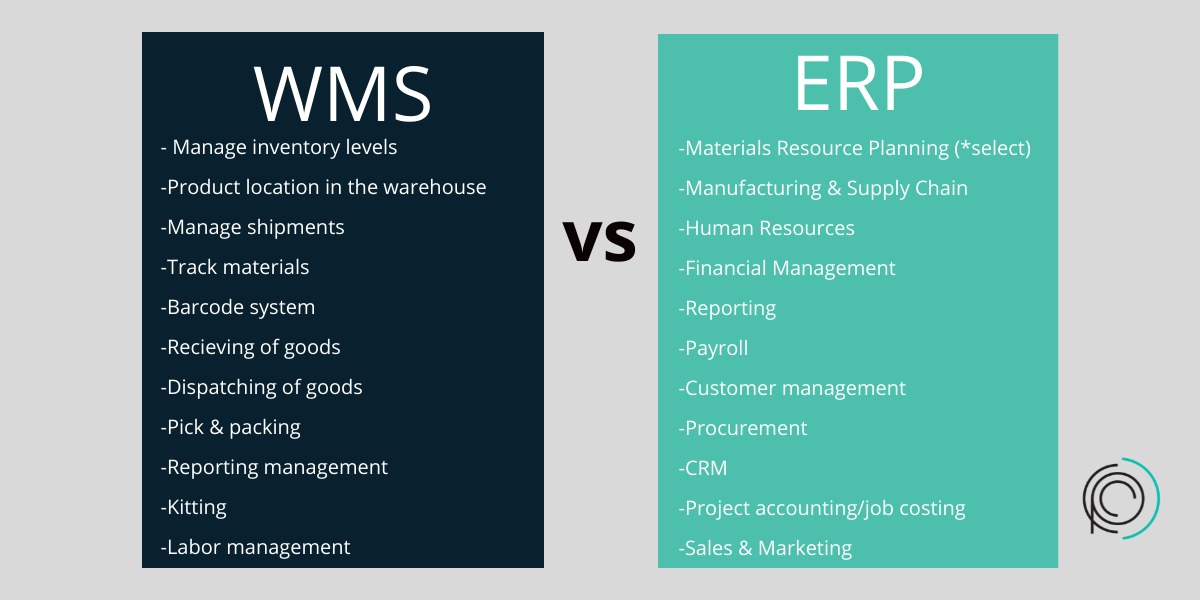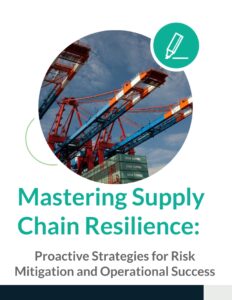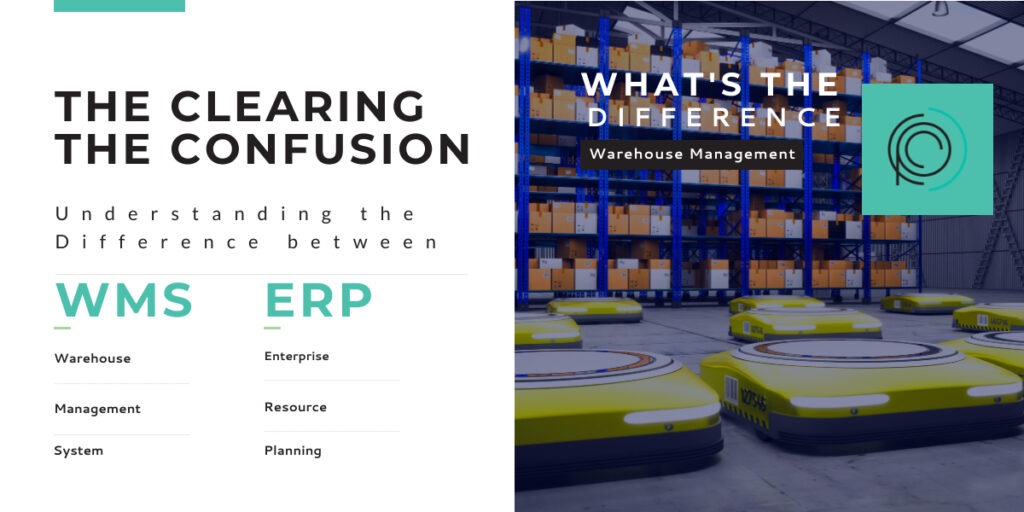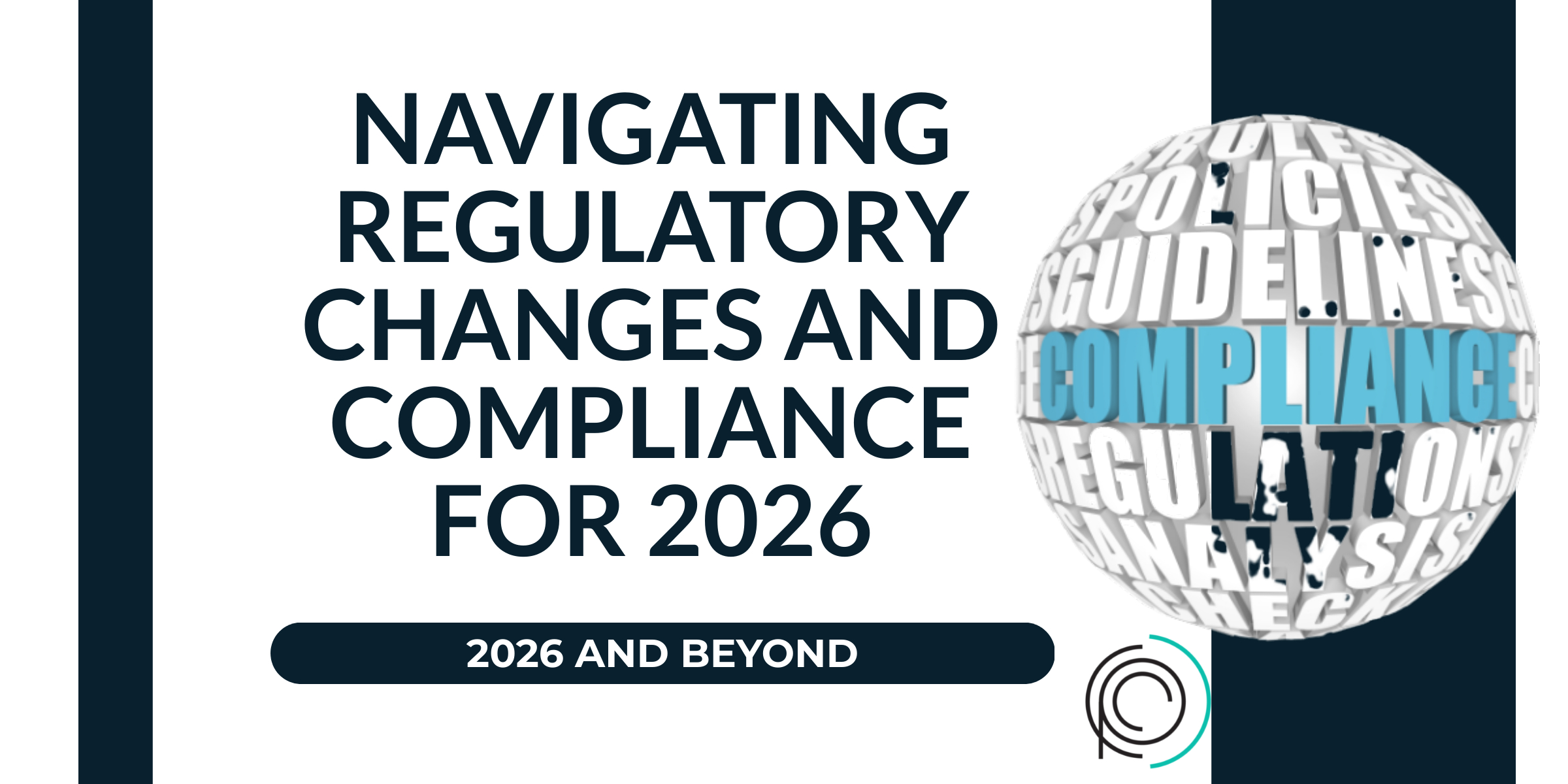Decoding the Tech Alphabet: Navigating the Distinct Roles of ERP and WMS in Business Success
There are so many acronyms and software systems emerging that it can get really confusing for anyone trying to run an effective business. You may have heard of terms like ERP – Enterprise Resource Planning system and WMS – Warehouse Management System being thrown around. They are very common platforms typically used in the manufacturing, logistics, and warehousing space. But do you know what each system does and how it can contribute to the overall business goals? While both ERP and WMS systems are software solutions that manage your business processes, their functionalities are vastly different. In this blog, we will discuss the differences between an ERP and a WMS, and how to determine which system best suits your specific business needs.
What is an ERP?
ERP stands for Enterprise Resource Planning. It is an all-encompassing software solution that integrates all your business operations, from manufacturing and supply chain management to human resources and financial management, using a single system. ERP systems are meant to streamline your business operations, eliminate manual tasks, automate workflows, reduce administrative costs, and provide real-time visibility into your business performance.
Streamlining Business Operations:
- One of the key benefits of ERP is that it can streamline your business operations, bringing all aspects of your business together in one unified system. This can include inventory management, order processing, production, and financial reporting. By eliminating the need for multiple disjointed systems, ERP enables you to streamline and optimize your business processes, saving time and money.
Automation and Workflow Optimization:
- ERP solutions typically include built-in automation features that can help you automate workflows and reduce manual tasks. This can include automated order processing, inventory tracking, and financial reporting. By automating these tasks, you can reduce errors, improve efficiency, and free up your staff to focus on more important tasks.
Real-Time Visibility into Your Business Performance:
- With an ERP, you can get real-time visibility into your business performance, allowing you to make more informed decisions about how to proceed with bottom-line matters. This can include real-time inventory tracking, sales data, financial reports, and more. By having this information at your fingertips, you can identify trends, make informed decisions, and adjust your strategy accordingly. Remember sitting on too much inventory or having too little inventory at any given time can make or break business goals.
Reduced Administrative Costs:
- Another benefit of ERP is that it can help you reduce administrative costs, by automating manual processes and streamlining workflows. This can free up your staff to focus on more value-adding activities, while also reducing the risk of errors and inefficiencies.
Scalability and Flexibility:
- Most ERP systems are designed to be scalable and flexible, allowing you to adapt to changing business needs over time. Whether you need to add new users, expand your product lines, or enter new markets, ERP provides the flexibility and scalability you need to adapt and thrive.
What is a WMS?
A WMS, on the other hand, is a Warehouse Management System. As its name suggests, it is a software solution designed to optimize and streamline your warehouse operations. A WMS system can help you manage inventory levels, track materials, manage shipments, and improve order fulfillment times. WMS also provides real-time data on inventory levels, location information, and order status, giving warehouse managers the visibility and control they need to optimize their warehouse operations and reduce overall costs.
- Improved Inventory Management:
- One of the most significant benefits of a WMS is its ability to optimize your inventory management. It can help you track inventory levels, reduce the risk of stockouts, and calculate the best locations for storing goods. Since it provides real-time data on inventory levels, you can easily monitor stock levels and identify trends in demand. This information enables you to make data-driven decisions about inventory replenishment and stock placement, which can ultimately boost your supply chain’s efficiency.
- Enhance Order Fulfillment Efficiency:
- Order fulfillment is another area where a WMS can help you streamline your warehouse operations. With the software’s real-time visibility, you can keep track of inbound and outbound shipments, allowing you to organize orders for timely and efficient delivery. The WMS can help you track order status, verify if items are picked accurately, and track every stage of the order fulfillment process. This efficient system can help ensure customers receive their orders promptly, improving customer satisfaction.
- Improved Labor Efficiency:
- Another crucial metric for assessing warehouse efficiency is labor efficiency. A WMS can help managers identify bottlenecks in their operations, monitor employee performance, and automate routine tasks. By automating manual or labor-intensive processes, warehouse employees can focus on higher-value tasks, leading to increased productivity and output. With the WMS’s streamlined operations, warehouse employees can perform duties more efficiently and with greater ease.
- Cost Reduction:
- A WMS also directly impacts your warehouse operation’s bottom line by reducing costs associated with warehouse management. By optimizing everything from inventory management to order fulfillment, and labor efficiency, a WMS can help reduce operating expenses, lower material handling costs, and decrease warehouse storage capacity requirements. Combining all of these benefits can significantly reduce overall costs improve ROI, boost overall income, and ultimately strengthen the bottom line.
Comparing ERP and WMS functionalities
ERP and WMS have vastly different functionalities. While ERP offers a broad view of your entire business operations, WMS focuses mainly on optimizing and managing your warehouse processes. ERP is ideal for companies that operate in multiple locations, have a vast supply chain network, and require visibility into their entire operation. On the other hand, WMS is perfect for businesses that have a significant focus on warehousing and distribution processes.
ERP and WMS are two different software systems that serve very different purposes when it comes to managing your business. ERP is an all-in-one system that covers all aspects of a business, from accounting and HR to inventory, sales, and customer management. ERP software provides a centralized location where users can access all the information and functionality, they need to run a business smoothly. In contrast, WMS focuses solely on managing the warehouse processes that include inventory management, order processing, and shipping.
While ERP software offers a broad view of your entire business process, including financial data, operations, inventory, and customer data, WMS is solely focused on optimizing and managing your warehouse processes. So, if your business heavily relies on your warehouse and distribution processes, WMS is what you need. WMS plays a critical role in tracking inventory levels, stock locations, and enabling faster processing and shipping times. It helps to organize and streamline the supply chain process by tracking the delivery of raw materials to the point of final production and delivery of products.
One major advantage of ERP is that it offers a comprehensive view of your entire business operation, which makes it ideal for companies that have multiple locations, vast supply chain networks, and require visibility and control over their entire operation. By having a centralized system that can be accessed from anywhere, business owners and managers have the ability to monitor and track every aspect of their operations, analyze data, and make informed decisions based on real-time data.
On the other hand, WMS has a more specific application and is ideal for businesses that have a significant focus on warehousing and distribution processes. It enables businesses to improve warehouse efficiency, optimize workflows, and reduce costs such as labor, space, and inventory management. WMS software offers powerful inventory management features such as tracking inventory levels in real-time, monitoring stock levels, and picking, packing, and shipping orders more efficiently.

How to determine which system best suits your business needs?
Determining which system best aligns with your long-term business goals depends on several factors. Firstly, it is essential to assess your current systems and processes and identify where the inefficiencies lie.
Secondly, consider if you have an existing ERP or WMS in place and if the system you are considering can integrate with your existing infrastructure.
Lastly, you need to evaluate the ROI each system can deliver by assessing how it will impact your specific business processes.
I do not recommend making a blind purchase or do some research and then determining your needs yourself. You will need to fully understand your current processes and your current technology before you make any changes; be sure to involve your team in this process.
In conclusion, selecting the right software solution for your business should always depend on your overall business goals. Remember this is a long-term investment, you want to have all of the facts and make the right choice the first time. ERP and WMS have different functions and are best suited for different business models and needs. Ultimately, you should look for a solution that can help integrate your entire business operations and provide you with a holistic view of your business performance. At the same time, it should help you optimize your warehouse processes to reduce costs, increase efficiency, and improve customer satisfaction. With this information, you can make an educated decision and choose the solution that best suits your business needs.
If you have questions on how to optimize your business, book a no obligation call with one of our experts today.







